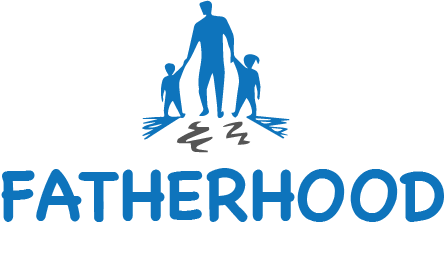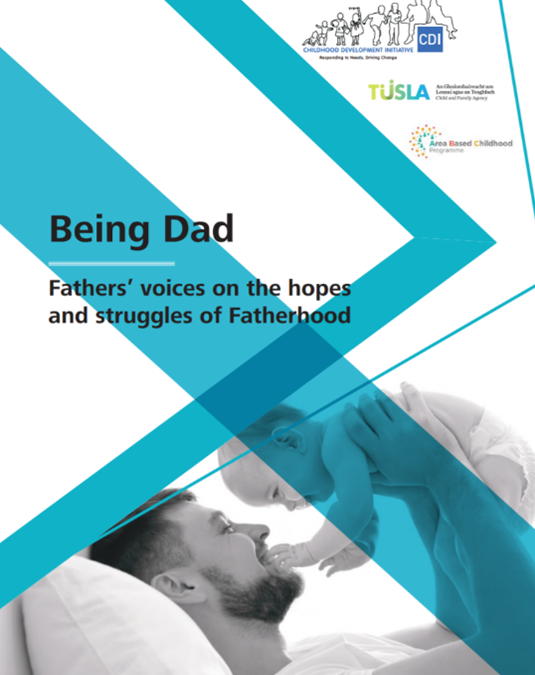By Phil Hall, An Cosán
On 30th September 2021, the Children Development Initiative (CDI) launched their research paper “Being Dad: Fathers’ voices on the hopes and struggles of Fatherhood[1]. This paper produced qualitative and quantitative research to highlight changing attitudes towards fatherhood in Ireland. The qualitative research comprised of 11, in-depth, one-to-one, semi-structured interviews with fathers.
The launch of the paper was prefaced by JP Byrne who discussed a cultural and societal shift in attitudes towards fatherhood in Ireland. JP also pointed out that it was publications such as this that enabled open and frank conversations about how fatherhood is, and how we would like it to be.
The first speaker Jonathon Doyle, CEO of Citywise spoke passionately about his life growing up in Jobstown, Tallaght with his mum and brothers in a single parent home. He contrasted these events with reflections of his own experiences of becoming a dad. Jonathon discussed how he and his wife navigated pregnancy and childbirth, and his desire to play an active role in the upbringing of his daughters. However, Jonathon felt many of his interactions with medical practitioners were problematic as his presence and opinions were undervalued. Experiences such as this were also identified and discussed in the CDI Being Dad Report.
Celine Moran, Parenting Specialist with CDI reiterated the societal shift in the role of the father, and provided an excellent executive summary of the report which was conducted with very clear objectives which included:
- to give voice to dads and gain an in depth understanding of their lived experiences in relation to their caregiver roles.
- to identify and highlight any structural and psychosocial barriers to their involvement as equal caregivers to their children.
- to ultimately improve children’s lives and outcomes by empowering dads and expectant dads to fully engage as equal caregivers of their children. (CDI, 2021).
Celine spoke about the emergence of three major themes which arose from the conversations with the fathers. These themes include:
Firstly, was that fathers wanted to be actively involved in the caregiving responsibilities of their children such as feeding, changing, and soothing their children when they are upset and reading stories at bedtime. The next salient point was that there is a recognition of the bonding that occurs in these interactions and fathers relish the opportunity to create those bonds. Celine was clear that most of the interviewees would welcome increased equality in caregiving duties. The final point was that there were several barriers identified, many of which were also identified in the interviews An Cosán conducted as part of Erasmus+ funded Fatherhood project. Specifically, the balancing of work commitments and a lack of information and support for fathers. There was a feeling that all information and supports were focussed on the mother, which sent “mixed messaging on their role and a tendency to defer to the mother as experts in child rearing” (CDI, 2021).
Findings strongly reflected the views of Jonathon Doyle that many fathers felt isolated when interacting with healthcare professionals, and believed they were seen primarily as a support for the mother rather than a parent who was living this experience with their partner.
Dave Saunders, CEO of From Lads to Dads discussed the work his organisation does to advocate for dads, and the support they provide to men of all ages in their transition into parenthood. From Lads to Dads provides a space for dads to be listened to, as they support dads to bond and connect with their children throughout the perinatal space and beyond.
This research piece conducted by CDI and the information gained through the interview process demonstrates the need for fathers to feel supported in the parental space and highlights the severe lack of services to support dads and dads to be. This can result in dads feeling they are in the way and not a part of the process. The report also emphasises that fathers want more involvement in the upbringing of their children. They want to be immersed in it, to experience it and cherish it. The days of fathers representing stoicism and masculinity have evolved to a stage where they are no longer supporting actors, but rather co-stars with their partners in their most important role.
To read the Full Report click here.
[1] Childhood Development Initiative, (2021). Being Dad: Father’s voices on the hopes and struggles of Fatherhood. Dublin, Childhood Development Initiative.


Recent Comments